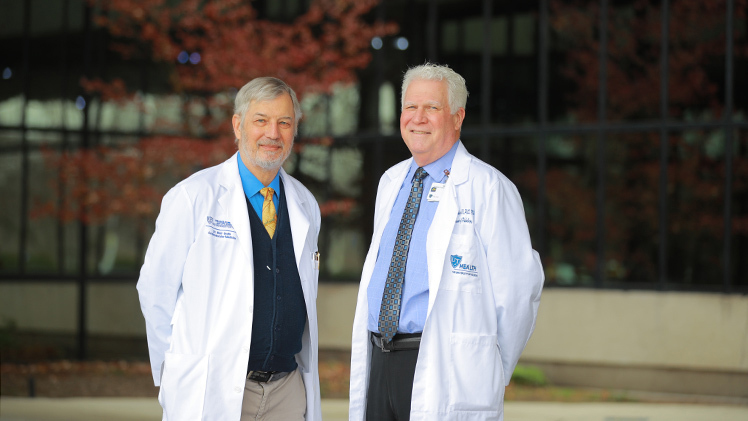The symptoms of postural orthostatic tachycardia syndrome, or POTS, can be as varied as they are confounding.
There can be fatigue, pain, bleeding disorders and anxiety. Heart palpitations and lightheadedness are common. Some patients experience gastrointestinal issues or brain fog. For the most severely affected, the simple act of standing up can send them crumpling into unconsciousness.
Though likely much more common than once thought, POTS remains something of a mystery. Many physicians have never heard of it. There’s no lab test to confirm a diagnosis and no treatment to cure the condition.

UToledo’s Dr. Blair Grubb and Dr. William Gunning are collaborating on innovative research to prove the long-held theory that POTS is an autoimmune disorder.
That could all be changing, owed in large part to the persistence of researchers Dr. William Gunning and Dr. Blair Grubb from The University of Toledo.
“For a long time, people would question whether this disorder even existed,” said Grubb, a cardiologist at The University of Toledo Medical Center and Distinguished University Professor in the UToledo College of Medicine and Life Sciences.
Grubb, who has been treating POTS patients and studying the condition for more than three decades, now believes he and his collaborators are increasingly close to proving a long-held theory that POTS is an autoimmune disorder.
He and Gunning, a professor of pathology in the UToledo College of Medicine and Life Sciences whose expertise is in platelet disorders, are collaborating on innovative research examining patients’ plasma for autoantibodies and inflammatory markers.
In a retrospective study of 34 POTS patients, Gunning, Grubb and a team of UToledo scientists documented a significant elevation of five inflammatory markers characteristic of an innate immune condition.
“This is a tremendous step forward,” Grubb said. “Not only does this work give additional credence to the existence of POTS, we have an idea of pathophysiology and would potentially have a very simple diagnostic test. We don’t yet have that with POTS, but these studies suggest we are getting close.”
The inflammatory markers identified in the research — a mixture of specific cytokines and chemokines — are similar to those seen in patients with other autoimmune disorders, including psoriasis, multiple sclerosis and rheumatoid arthritis.
The paper, published in the journal Clinical Medicine, builds on years of research led by Gunning and Grubb. In 2019, the duo published what was at the time the largest study of POTS patients to date, finding 89% of patients had elevated levels of autoantibodies against the adrenergic alpha 1 receptor.
Taken together, the two publications are among the strongest evidence yet that POTS is an autoimmune disorder.
Grubb and Gunning also have hypothesized that POTS may be initiated by a viral infection.
“There are a number of patients previously diagnosed with COVID-19 being labeled ‘long-haulers.’ They develop similar symptoms to POTS and many have even been diagnosed with POTS post-COVID,” Gunning said. “We don’t know whether POTS is acquired or inherited, but viral infections cannot be dismissed as an initiating event in the development of POTS.”
While they have yet to test the theory, Grubb and Gunning have observed recent Epstein-Barr viral infections in many patients’ medical histories.
“The development of POTS post-COVID is an additional piece of evidence that a viral infection might start a cascade of chemicals produced by the innate immune system in the development of autoantibodies,” Gunning said.